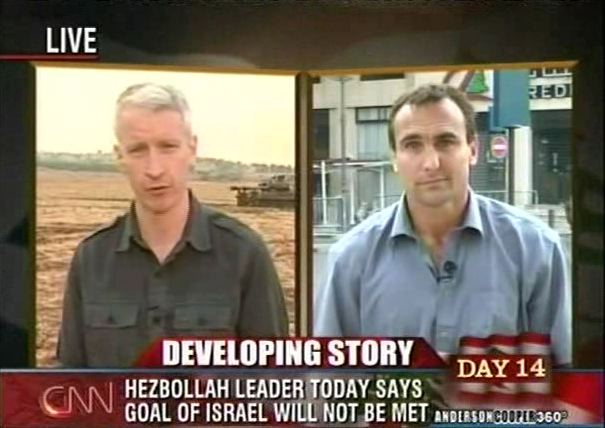
Michael Ware
AC: "This war with Hezbollah has only just begun."

Click
photo to play
Length: 4:17
ANDERSON COOPER: Well, Hezbollah is also counting on
their leader, Hassan Nasrallah, who today said he
plans to take the battle beyond Haifa.
CNN's Michael Ware joins me now from Beirut. Michael,
what do you think he meant by that?
MICHAEL WARE, CNN CORRESPONDENT: Well, Anderson, I
suspect that he means geographical expansion of the
range of their attacks. So I dare say that whilst it
may involve some kind of escalation in terms of
tactics and operations, I think immediately it could
mean that they plan on using perhaps longer-range
weapons or weapons to greater effect within Israel.
COOPER: There's also of course this propaganda war
being waged. Israeli Defense Forces saying they've
captured more than 100 Hezbollah rockets. They say
they've captured a significant Hezbollah leader in
the last 24 hours in south Lebanon. We're also
hearing from Hezbollah really a completely different
story. They're contradicting virtually all the things
the Israeli Defense Forces are saying.
WARE: Yes, absolutely, Anderson. And from spending
time with Lebanese -- senior Lebanese army officials,
generals, from talking to Hezbollah representatives,
and defense analysts and academics here in Lebanon,
one thing is very, very clear. This war with
Hezbollah has only just begun. They barely scratched
the surface of this organization.
And in terms of the IDF, the Israeli Defense Force
operations in southern Lebanon, the Lebanese here are
saying that these do not have the significance that
the IDF would like the world to believe.
These townships that they are assaulting or have
captured, they say have a strategic advantage in
terms of terrain. But in terms of Hezbollah and its
command structure and its arsenal, they are minimal
at best. They're saying that this is very much
overblown.
And what they argue is what we will see now is
Hezbollah trying to draw the Israeli forces deeper
into Lebanon, stretch their supply lines, and then
attack them where they're weakest.
COOPER: Every Israeli officer I talked to seems to
have, I don't know if respect is the right word, but
an understanding of the strengths of Hezbollah. These
guys have been in this territory for a long period of
time. They have entrenched positions. What about the
Lebanese military? Do they have any capabilities if
they wanted to, either to battle Hezbollah, if things
turn that way, or if they joined with Hezbollah, as
some Lebanese have threatened they would, what would
that mean?
WARE: Well, Anderson, I think it's very, very clear,
even at this point, that given those choices, the
Lebanese army see a very clear path. It would not be
to battle Hezbollah, but it would be to join them.
You look at the Lebanese army official Web site, and
it refers to Hezbollah as Lebanese resistance. In
fact, the way it was painted to me by both Hezbollah
and Lebanese army officials is that, essentially, the
defense of Lebanon cannot possibly be hoped to be
left to the Lebanese army.
So in essence, for a long time now, it has been
contracted out to Hezbollah. If the Lebanese army
stood toe to toe with the Israeli Defense Forces, one
Hezbollah official said they wouldn't last a day. One
Lebanese general said they wouldn't last an hour. The
only way to defend Lebanon, they say, is guerilla
warfare, insurgency warfare, of the very kind that
Hezbollah is so adept at and the Lebanese army is
just not equipped for.
COOPER: And of course, that's why so many
governments, including the U.S, are saying some sort
of international force would be needed to essentially
occupy south Lebanon. And at the same time, trying to
build up that Lebanese military.
Michael Ware, appreciate your reporting from Beirut
for us.